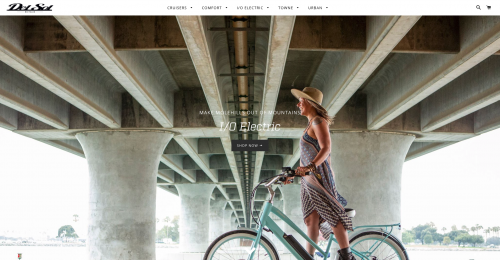VISTA, Calif. (BRAIN) — Haro Bicycle Corp. is one of thousands of companies dealing with lawsuits over their websites' compliance with the Americans With Disabilities Act.
A Brooklyn, New York-man who is legally blind is the lead plaintiff in a class action lawsuit filed last week against Haro in the U.S. District Court for the Southern District of New York. The man, Valentin Reid, says Haro is violating the ADA because one of its websites, ridedelsol.com, is not accessible to the blind.
Reid is the lead plaintiff on at least four other similar suits filed in the court last week, and legal experts say thousands of such suits have been filed in recent years. One source counted over 2,200 such suits filed in 2018, a 177% increase over the year prior. Haro is likely not the first bike-related company to be sued over website ADA compliance, but the suit is the first against a bike company that BRAIN has found through online court filing searches.
"We believe our site to be in compliance with ADA requirements; the plaintiff obviously disagrees" — Haro's Joe Hawk.
Reid is asking for legal fees and compensatory and punitive damages. He is represented by the Stein Saks lawfirm of Hackensack, New Jersey. The other suits he filed last week are against a vape company, a heat-transfer device supplier, a lab equipment supplier, and a wine e-commerce site.
Joe Hawk, Haro's COO, said the company is aware of the suit but has yet to receive the complaint and its lawyers have not reviewed it.
"In an initial test of our site we believe our site to be in compliance with ADA requirements; the plaintiff obviously disagrees," Hawk said.
Even more on the way?
A U.S. Supreme Court's decision earlier this month to decline to review a lower court's decision on website ADA compliance may have opened the door to even more such suits, according to some legal experts.
The high court denied a request to review a lower court's decision that Domino's Pizza must make its website accessible to people with visual impairments.
The decision "will ensure that the spate of lawsuits filed (and demand letters sent) across the United States, to any commercial enterprise with a website, will continue for the foreseeable future," an article published last week on the legal site Lexology reads.
"Given that any business with a website may be targeted by website accessibility claims, companies are strongly recommended to take preventative measures, including adopting a website accessibility policy, reviewing options to scan and updating their websites to comply with trending website accessibility and lawsuit deterrence standards."
No clear standards
ADA compliance generally requires a site to be compatible with screen readers and other features allowing full access by those with disabilities to information and functions, including its shopping cart functions. But the lack of clear guidelines complicates the issue for website owners and is contributing to the rash of suits. The U.S. Justice Department began to draft such regulations in 2010, but ended the rulemaking process last December in the name of reducing federal regulations.
Attorney Steven Hansen, a BRAIN contributor who has worked with bike companies on legal issues for years, said some responsibility for ADA compliance should fall on the outside web developers that many companies contract to build their sites.
"Quite frankly the web designers should be held accountable by their clients for ADA compliance at a minimum," Hansen said. "Websites are global and need to comply with lots of laws, not just ADA, such as the EU's General Data Protection Regulation ... as well as safety data and the recall data CPSC demands ... You also have under-18 consumers and privacy rules," he said.
"Companies need to be aware of these types of problems and think ahead. Much cheaper to fix a website now than deal with one of these suits. Quite frankly lawyers familiar with these issues should be working with the web team to make sure there is legal compliance, not just 'flashiness.'"
Haro's Joe Hawk said the company is committed to correcting any broken links or parts of the site the make it difficult to use by the disabled.
"Haro fully supports the ADA and any actions that result in legitimate betterment for disabled persons. We are a bit confused however on how this individual may have been damaged or inconvenienced. Our products are sold at retailers world wide and information is readily available ... If the complaint was sincere, it could have come direct to Haro rather than through the legal system," he said.
More information: Steven Hansen's law firm website is swhlaw.com.


